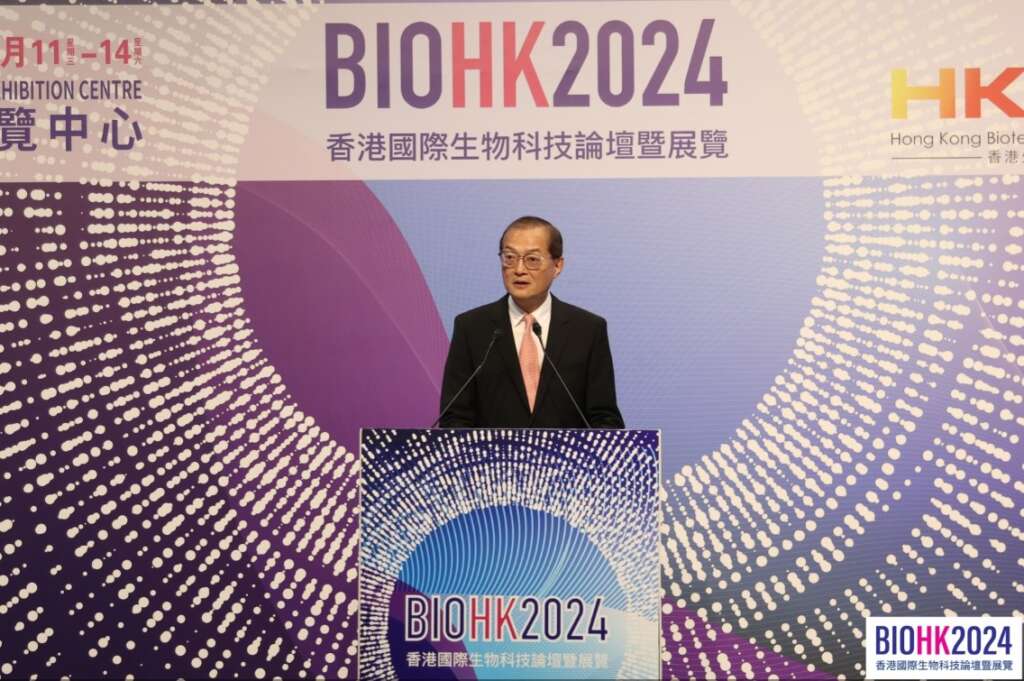Hong Kong’s health authorities have set their sights to revamp incumbent mechanism of registering new medicine and medical devices, transforming Hong Kong into a global health and medical innovation hub.
Delivering a keynote speech on the second day of HKBIO 2024 conference, Secretary for Health Lo Chung-mau said the city has strived to become an international health and medical innovation hub.
Lo said this after the government has earlier unveiled its initiative to create a system for direct approval of drugs and medical devices without the need to be reliant on overseas regulatory authorities.
The government will entice more pharmaceutical enterprises and medical device businesses to undergo research and clinical trials in the city, ensuring that mechanism of registering medicine and medical devices will be widely acclaimed on the global stage.

Earlier, the SAR health authorities have implemented the “1+” mechanism, which has allowed Hong Kong to expedite the approval of applications for registration of new drugs for life-threatening or severely debilitating diseases.
Under the mechanism, medicine for life-threatening or severely-debilitating diseases with local clinical data can be registered conditionally with one certificate of pharmaceutical product issued by reference drug regulatory authorities, namely the National Medical Products Administration, rather than two certificates under the previous arrangement.
PRECISION MEDICINE
In the panel of “Precision Medicine”, Professor Leslie Leinwand, Chief Scientific Officer of the University of Colorado, has shared about how novel medication myosin inhibitors can help treat obstructive hypertrophic cardiomyopathy (HCM) – which is one of the most common heart genetic diseases and common cause of sudden death among young people.

Professor Leinwand said recent research studies have specifically focused on developing myosin-specific therapeutics. Having been approved by the US Food and Drug Administration recently, novel medicine mavacamten is a myosin inhibitor that reduces hypercontractility among HCM patients.

Professor Leinwand has focused on the genetics and molecular physiology of inherited diseases of the heart, particularly how biological sex affects the heart in health and disease, in her research areas.
Also, Wang Jiguang, Assistant Professor of Hong Kong University of Science and Technology (HKUST) on Life Science, has mentioned about precision medicine for glioma – which is a type of primary tumour in the brain – and how Artificial Intelligence (AI) can help treat patients.

Professor Wang said AI machine learning model of cancer evolution has outperformed conventional methods for stratifying patients. It can help enhance medical experts and doctors’ understanding on cancer evolution and advance patients’ care and treatment.
He added cancer evolution is stochastic and random, but some features are still predictable, such as hypermutation – which is the process of producing an unusually high number of mutations in human bodies.
He has established his computational laboratory at the HKUST, focusing on the application of data science in brain cancer genomics and medicine.
TREATMENT FOR PANCREATIC CANCER
Above all, Professor Li Min of the University of Oklahoma’s Health Sciences Center, who is a leading expert on pancreatic cancer (胰臟癌), has shared novel therapeutic strategies and early diagnosis are urgently needed for the cancer.

In his previous study on protein ZIP4, it has found that ZIP4 helps transports zinc throughout the body.
Professor Li said the study has identified a previously uncharacterized role of ZIP4 in pancreatic cancer, indicating that ZIP4 is a new cancer therapeutic target.

Zinc deficiency can cause growth retardation whereas overdose can lead to Zinc toxicity cancer, and therefore Zinc levels need to be balanced in human bodies.
All images are from BIOHK 2024.
